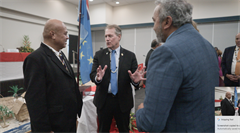One of the most critical roles of the United States Congress is to serve as a separate, independent and co-equal partner with the executive branch in charting the best way forward for our country’s role in our world. For just as our Hawai‘i is a part and leader of the Indo-Pacific, so is our country a part and leader of our international community.
These are extraordinary and challenging times for our world and our country’s role. Just some of our larger challenges include the continued rise of bad state actors like the People's Republic of China, Russia and Iran, authoritarianism, global terrorism and climate change. These issues hold both great opportunity and risk, and how we address them will largely define the rest of the Twenty-First Century.
My Priorities in the Indo-Pacific
My foreign policy priorities extend throughout the globe, but central to our foreign policy in this century is the Indo-Pacific region, stretching from the West Coast through the Pacific and Asia to well into the Indian Ocean. As stressed in our nation’s previous National Security Strategies, this region is critical to our county. It holds over sixty percent of the world’s population and seven of the top fifteen largest standing armies in the world. Sixty percent of global maritime trade flows through Asia, and eight of the world’s ten busiest seaports are in the Indo-Pacific. In this “Pacific Century,” Hawai‘i should and will continue to play a leading role in our country’s overall foreign relations. Hawai‘i is the bridge between the United States and Asia, and I am proud to champion our leadership and values here in Congress as your representative.
My efforts include co-founding and co-chairing the first-ever Congressional Pacific Islands Caucus to collectively advocate on issues critical to the Pacific Islands region, including Hawai‘i. I have also proudly testified to numerous House committees, including the House Foreign Affairs Committee and the House Armed Services Committee, on the importance of Hawai‘i, the Pacific Islands and the Indo-Pacific region to our national security.
Through my Pacific Islands Caucus, I am leading efforts to reassure our Pacific Island allies of the United States’ continued commitment to our part of the world. This includes our Boosting Long-Term U.S. Engagement in the Pacific Act, also known as the BLUE Pacific Act, which I first introduced in the 116th Congress (2019-2020). This bill provides a comprehensive, whole-of-government strategy for the United States in the Pacific Islands, focusing on increasing our diplomatic presence and engagement, enhancing security and development assistance and promoting shared values such as good governance and the rule of law. Much of the previous versions of the BLUE Pacific Act has been enacted or implemented as a result of our efforts in previous Congresses, but key provisions remain and are included in this version, in addition to provisions from other bipartisan U.S.-Pacific Islands bills introduced in the 118th Congress, including the Pacific Partnership Act and the Engage the Pacific Act. It also adds provisions that incorporate various developments in the Pacific Islands over the last few years, including goals and needs articulated by the Pacific Islands themselves that are in line with U.S. interests.
Federal Appropriations
I am also working hard to maintain and expand Hawaii’s leadership role in the Indo-Pacific, specifically through close cooperation with and support for our East-West Center. Founded by Congress in 1960 and located at the University of Hawai’i-Manoa, the East-West Center is a national educational institution dedicated to fostering better relations between the United States and the countries and peoples of Asia and the Pacific Islands. The Center’s programs are widely known throughout the region and have a measurable, positive impact on our foreign relations. As a member of the House Appropriations Committee, I helped secure $22 million for the East-West Center for Fiscal Year (FY) 2024 and FY 2025. While the current administration has proposed to zero out federal funding for the Center in FY 2026, I will continue to work to defend the Center's funding.
Through my assignment on the House Appropriations Committee, I have also fought for key funding priorities that align with our country’s interests and values. These include increased funding for the Peace Corps; educational and cultural exchange programs; development assistance programs, including for global health, basic education and women’s empowerment; humanitarian and disaster assistance; contributions to international organizations, including the United Nations and peacekeeping; and environment programs to promote biodiversity and combat wildlife trafficking. Although funding for all of these programs is under severe threat from the current administration, Congress has the power of the purse, and I will continue to support funding for programs that advance our foreign policy goals of peace, prosperity and democracy abroad.
You can review more details of my foreign affairs related efforts here.


